
Are your gums trying to tell you something? Do not ignore the subtle warning signs that your oral health is at risk! Welcome to your comprehensive guide on periodontal disease, where we’ll explore everything from sneaky symptoms to cutting-edge treatments. Buckle up, because we are about to start a journey to healthier gums and brighter smiles!
What is Periodontal Disease?
Imagine your mouth is a bustling metropolis, with your gums serving as the foundation that holds everything together. Picture this: your mouth is a bustling metropolis, and your gums are the foundation holding everything together. Periodontal disease is a sneaky invader that gradually weakens this foundation. So, what exactly is it?
Periodontal disease, or gum disease, is an infection of the tissues that hold your teeth in place. It is like a silent troublemaker that starts out mild but can escalate to serious consequences if left unchecked.

Gingivitis vs. Periodontitis: Two Types of Gum Trouble
- Gingivitis is a mild and reversible form of periodontal disease. Consider this a warning sign that your gums are irritated and inflamed, but no serious damage has occurred. It is like the first crack of thunder before a storm.
- Periodontitis: If gingivitis is thunder, periodontitis is a full-blown storm. This more severe form of periodontal disease can destroy gum tissue and bone, potentially leading to tooth loss.
Periodontal Disease Stages: A Painful Journey
- Early Gingivitis: Your gums may appear red and puffy, and they may bleed when brushed. Do not panic, but do something!
- Advanced Gingivitis: Inflammation worsens and bleeding occurs more frequently. It is time to up your oral care game!
- Early Periodontitis: The infection first affects the bone. Gum pockets form, trapping additional bacteria. It is becoming serious now.
- Moderate Periodontitis: Deeper pockets develop, more bone is lost, and teeth may loosen. It is definitely time for professional intervention!
- Advanced Periodontitis causes significant bone loss, teeth become very loose, and you are at risk of losing them. Emergency dental care is critical at this point.

The Ripple Effect: How Periodontal Disease Affects Your Health
Periodontal disease affects the whole body, not just the mouth! Research has found links between gum disease and:
- Heart disease
- Diabetes
- Respiratory problems
- Pregnancy complications
So, caring for your gums is about more than just keeping your smile looking good; it is also about protecting your overall health!
Common causes and risk factors of periodontal disease
Have you ever wondered why some people seem to have more gum trouble than others? Let us look at the usual suspects for periodontal disease.
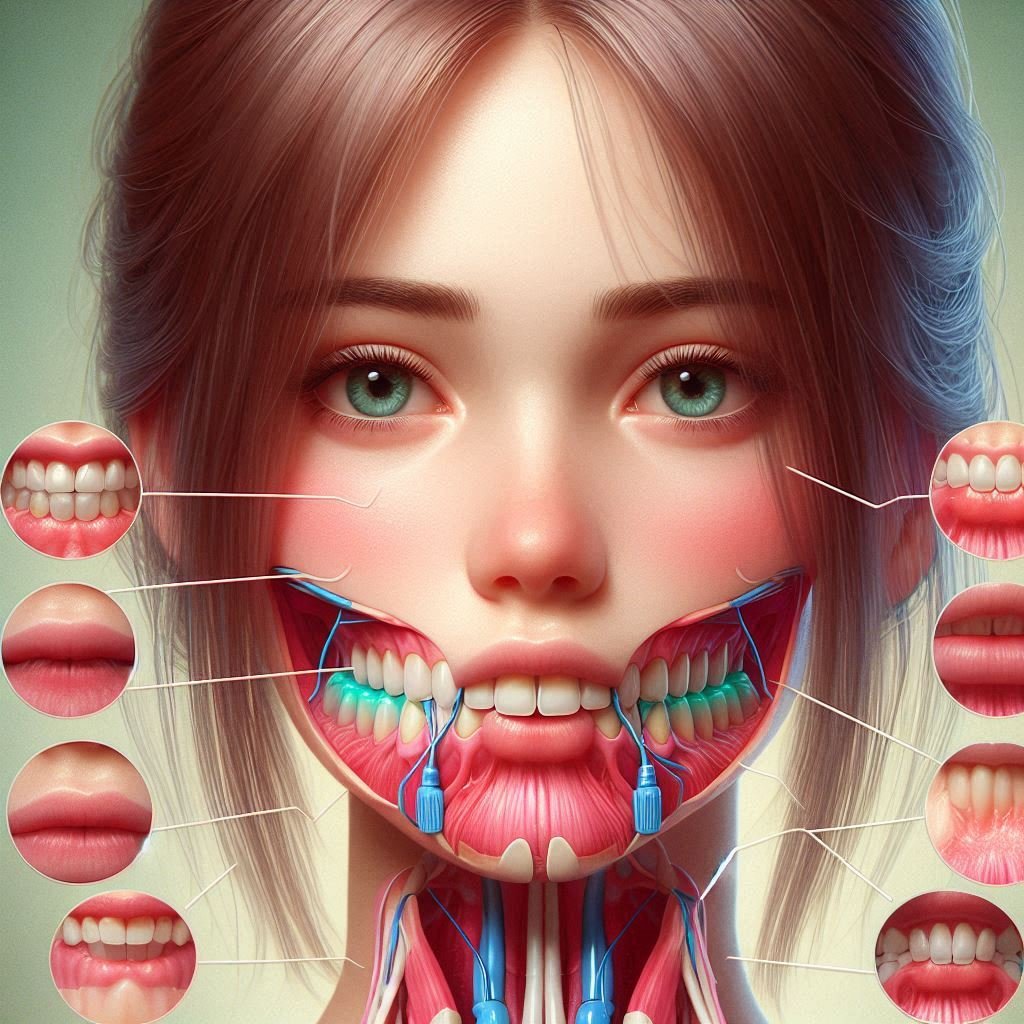
The Plaque Attack
Plaque is the number one public enemy of gum disease. This sticky film of bacteria forms on your teeth faster than you can say, “Brush twice a day.” If not removed on a regular basis, it hardens into tartar, which serves as a comfortable home for harmful bacteria.
Lifestyle Choices That Your Gums Hate.
- Smoking: Sorry, smokers! Tobacco use is like rolling out the red carpet for gum disease. It weakens your immune system and makes it harder for your gums to fight off infection.
- Poor Oral Hygiene: Not brushing or flossing is equivalent to leaving your front door wide open, inviting bacteria to party in your mouth.
- Stress: When you’re stressed, your body’s defenses are down, making it easier for gum infections to take hold. Time to take up meditation, perhaps?
Factors Beyond Your Control (But Not Beyond Help!)
- Genetics: Some people are genetically more susceptible to gum disease. But don’t worry, good oral hygiene can still save the day.
- Hormonal Changes: Pregnancy, menopause, or even your monthly cycle can make your gums more sensitive and prone to inflammation.
- Certain Medications: Some medications can reduce saliva flow, making your mouth more vulnerable to infections.
Watch out for these signs and symptoms.
Your gums are pretty good at dropping hints when something’s not right. Here are some red flags you should not ignore:
- Bleeding Gums: If your sink looks like a crime scene after brushing or flossing, it’s time to pay attention.
- Red, Swollen, or Tender Gums: Healthy gums should be pink and firm, not angry and puffy.
- Persistent Bad Breath: If your breath could knock out a horse, even after brushing, it might be more than just last night’s garlic bread.
- Receding Gum Line: Are your teeth looking longer? Your gums might be running away from the problem!
- Loose or Shifting Teeth: Adult teeth shouldn’t wiggle. If yours are doing the cha-cha, it’s time to see a dentist.
- Pus Between Teeth and Gums: Eww, gross! But seriously, this is a clear sign of infection that needs immediate attention.
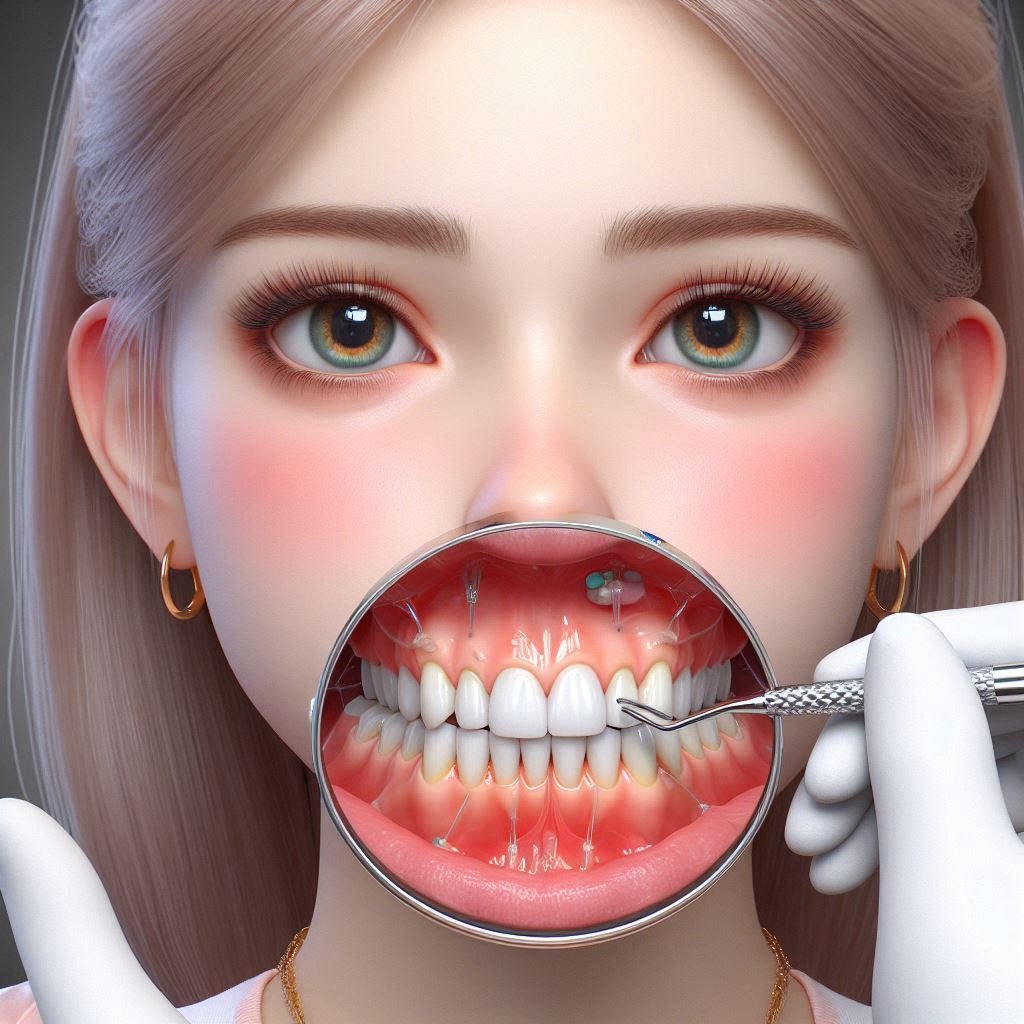
Remember, early detection is key. If you spot any of these signs, don’t wait – book that dental appointment pronto!
Diagnosis and Assessment Methods
So, you’ve noticed some gum troubles and booked a dentist appointment. Good job! But what can you expect when you get there? Let’s peek behind the dental curtain.
The Importance of Regular Check-ups
First things first – regular dental check-ups are your first line of defense against periodontal disease. Your dentist is like a detective, searching for clues that something might be amiss in your mouth.
The Periodontal Probing Adventure
Don’t worry, it’s not as scary as it sounds! Your dentist or hygienist will use a special tool called a periodontal probe to measure the pockets between your teeth and gums. It’s like measuring the depth of a tiny canyon in your mouth.
- Healthy pockets are usually 1-3 mm deep.
- Pockets deeper than 4 mm might indicate periodontal disease.
X-rays: A Window to Your Dental Soul
Dental X-rays are like superhero vision for your dentist. They can reveal:
- Bone loss around your teeth
- Tartar buildup below the gum line
- Other hidden problems your dentist can’t see with the naked eye
Advanced Imaging Techniques
In some cases, your dentist might use fancier imaging techniques like:
- 3D cone beam CT scans for a detailed view of your jaw and teeth
- Dental MRI for soft tissue evaluation
Genetic Testing: The Future of Periodontal Care?
Exciting developments are happening in the world of periodontal care! Some dentists now offer genetic testing to assess your risk for gum disease. While not yet widespread, this could be a game-changer in personalized dental care.
Treatment Options for Periodontal Disease in 2024
The good news? Periodontal disease is treatable! The better news? Treatment options have come a long way. Let’s explore your choices:
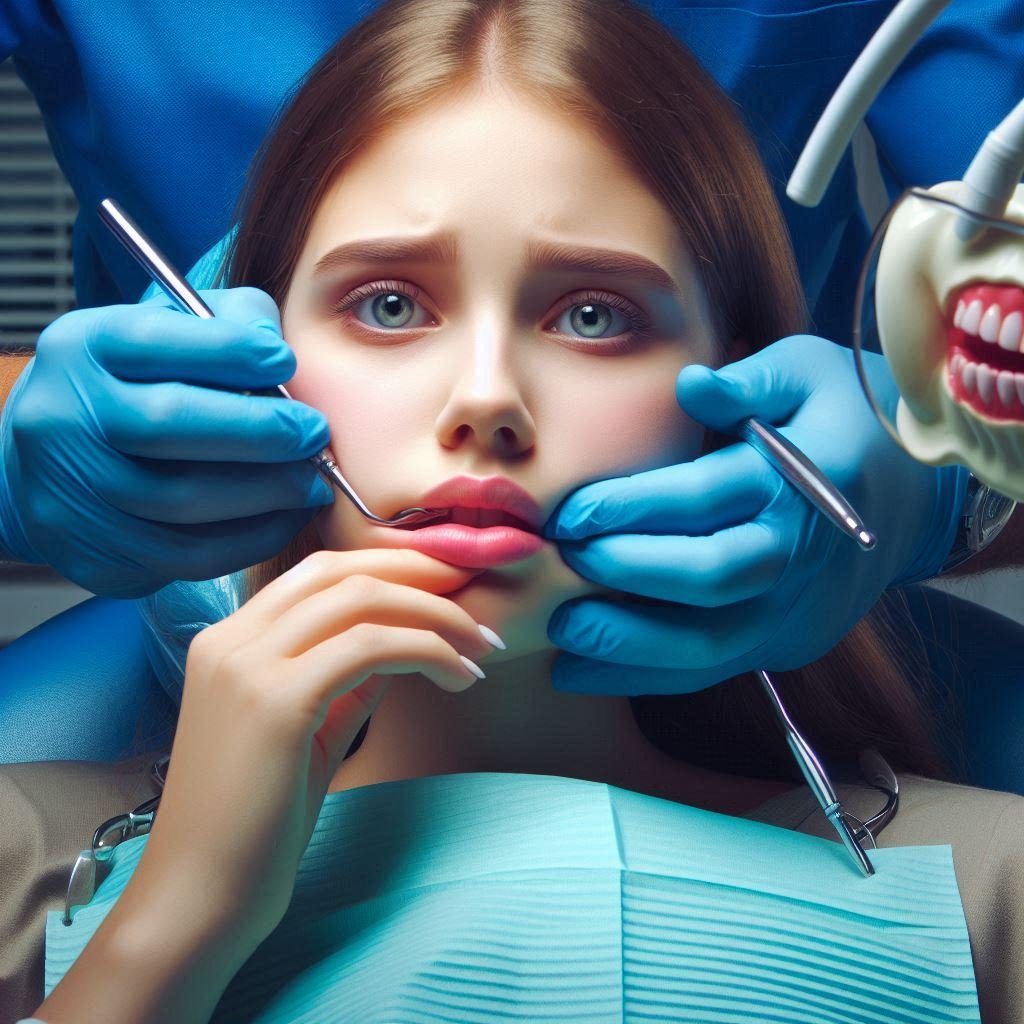
Non-Surgical Treatments: The First Line of Defense
- Scaling and Root Planing: Think of this as a deep cleaning for your teeth and gums. Your dentist or hygienist will:
- Remove plaque and tartar above and below the gum line (scaling)
- Smooth out rough spots on tooth roots to remove bacteria (root planing)
- Antibiotic Therapy: Sometimes, your dentist might prescribe antibiotics to help fight the infection. These can be:
- Topical (applied directly to the gums)
- Systemic (taken orally)
Surgical Interventions: When Things Get Serious
If non-surgical treatments aren’t enough, your periodontist might recommend:
- Flap Surgery: Your gums are lifted back, tartar is removed, and then the gums are sutured back in place. It’s like giving your gums a fresh start!
- Bone and Tissue Grafts: If you’ve lost bone or gum tissue, grafts can help regenerate what was lost. It’s like giving your mouth a renovation!
Cutting-Edge Treatments: Welcome to the Future of Periodontal Care
- Laser Therapy: Some dentists now use lasers to remove inflamed gum tissue and tartar. It’s less invasive and can promote faster healing.
- Regenerative Procedures: These advanced techniques use proteins, membranes, or tissue-stimulating proteins to encourage your body to regenerate bone and tissue naturally.
- Emerging Treatments: Keep an eye out for exciting developments like:
- Photodynamic therapy
- Probiotics for oral health
- Nanotechnology in dental care
Remember, the best treatment plan for you will depend on the severity of your condition and your overall health. Always consult with your dental professional to determine the most appropriate course of action.
Prevention Strategies and Oral Hygiene Best Practices
An ounce of prevention is worth a pound of cure, especially when it comes to your gums! Let’s dive into some top-notch strategies to keep periodontal disease at bay.
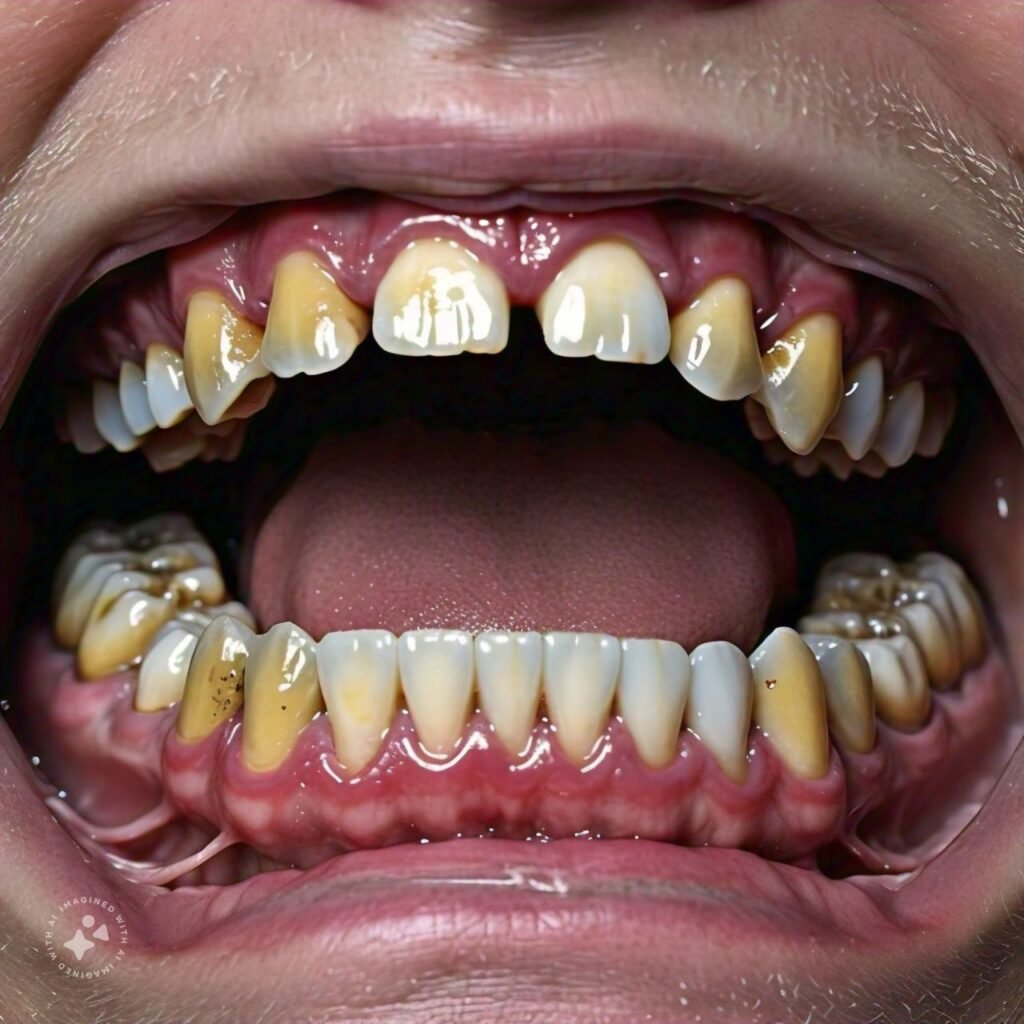
The Daily Dental Routine: Your Gums’ Best Friend
- Brush Like a Pro:
- Use a soft-bristled brush
- Brush for at least two minutes, twice a day
- Don’t forget to brush your tongue!
- Consider an electric toothbrush for extra oomph
- Floss Like Your Teeth Depend on It (Because They Do!):
- Floss at least once a day
- Use a C-shape to hug each tooth as you floss
- Try floss picks or water flossers if traditional floss is tricky
- Rinse for the Win:
- Use an antimicrobial mouthwash to reduce plaque
- Look for ingredients like chlorhexidine or essential oils
Professional Cleanings: Your Dental Dream Team
Schedule regular dental cleanings and check-ups. Aim for at least twice a year, or more if recommended by your dentist.
Diet Dos and Don’ts for Gum Health
- Do eat foods rich in vitamins C and D, calcium, and omega-3 fatty acids
- Don’t overindulge in sugary or starchy foods that feed harmful bacteria
- Do drink plenty of water to keep your mouth hydrated and clean
Kick the Habits That Kick Your Gums
- Quit smoking or using tobacco products
- Limit alcohol consumption
- Find healthy ways to manage stress (your gums feel your stress too!)
The Mind-Mouth Connection: Stress Less for Healthier Gums
Stress can weaken your immune system, making it harder for your body to fight off gum infections. Try these stress-busting techniques:
- Meditation or deep breathing exercises
- Regular exercise
- Getting enough sleep
- Seeking support when needed
Remember, prevention is an ongoing process. Make these practices a part of your daily routine, and your gums will thank you for years to come!
The Link Between Periodontal Disease and Systemic Health
Buckle up, folks – we’re about to explore how the health of your mouth can impact your entire body. It’s not just about a pretty smile; it’s about your overall well-being!
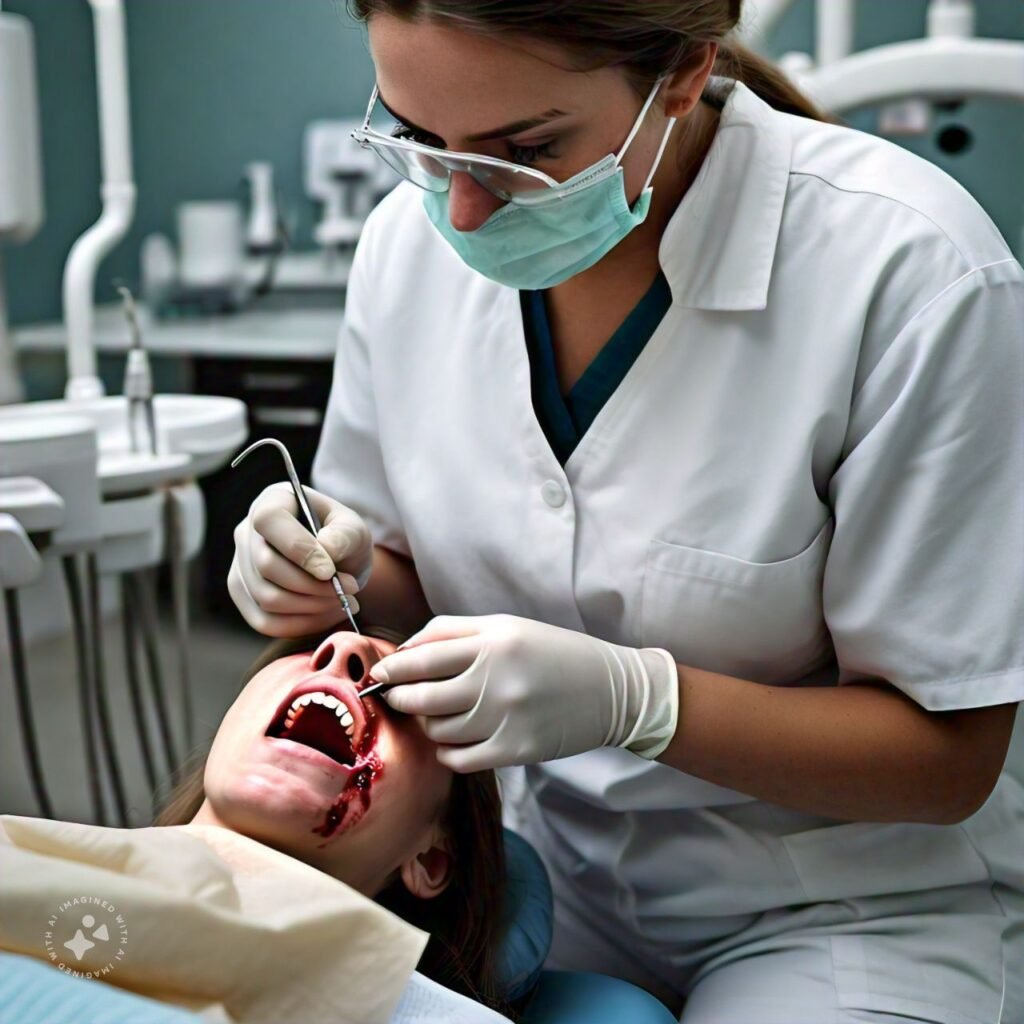
Heart Health: The Mouth-Heart Connection
Research suggests a link between periodontal disease and an increased risk of heart disease and stroke. Here’s the scoop:
- Bacteria from gum infections can enter your bloodstream
- This can cause inflammation in blood vessels
- Over time, this inflammation may contribute to heart disease
While more research is needed, maintaining good oral health could be another way to protect your heart. How’s that for motivation to floss?
Diabetes and Gum Disease: A Two-Way Street
If you have diabetes, you’re more likely to develop periodontal disease. But here’s the twist – periodontal disease can also make it harder to control blood sugar levels. It’s like a not-so-fun dance between the two conditions.
Tips for diabetics:
- Keep your blood sugar under control
- Pay extra attention to your oral hygiene
- Schedule regular dental check-ups
Respiratory Health: Breathe Easy with Healthy Gums
Believe it or not, the health of your mouth could affect your lungs. How?
- Bacteria from gum infections can be inhaled into your lungs
- This may increase the risk of respiratory infections or worsen existing lung conditions
So, taking care of your gums might help you breathe easier – literally!
Pregnancy and Periodontal Health: Baby Steps to Oral Care
Attention, expectant mothers! Hormonal changes during pregnancy can increase your risk of gum problems. But it’s not just about you:
- Some studies suggest a link between periodontal disease and premature birth or low birth weight
- Taking care of your gums might be another way to care for your growing baby
Remember to inform your dentist if you’re pregnant or planning to become pregnant.
Emerging Research: The Frontier of Oral-Systemic Health
Scientists are continually discovering new links between oral health and overall health. Some areas of ongoing research include:
- Connections to cognitive decline and Alzheimer’s disease
- Associations with certain types of cancer
- Links to rheumatoid arthritis
While more studies are needed, one thing is clear: taking care of your gums is a smart move for your whole body!
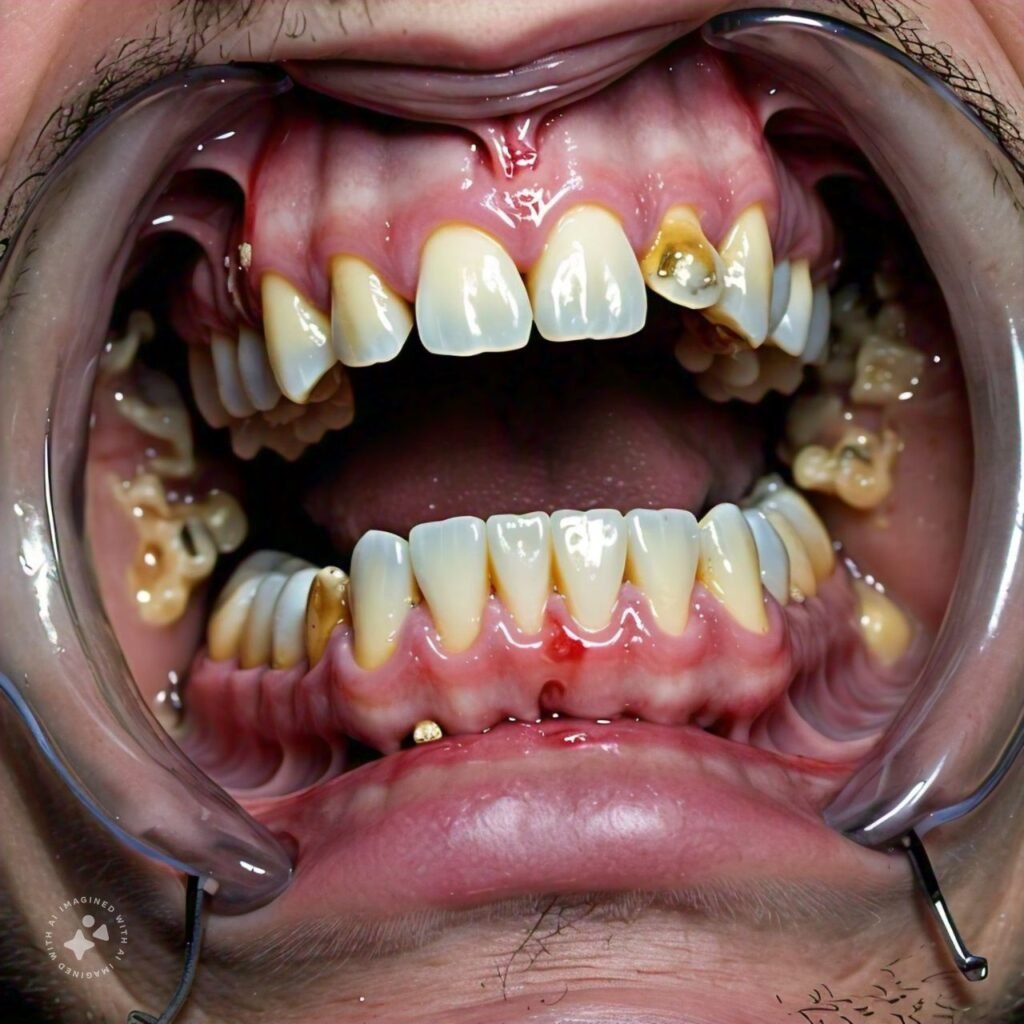
Is gum disease (periodontal disease) hereditary?
There is a genetic component to periodontal disease, but it’s not strictly hereditary in the same way as some other conditions. Genetics can influence your susceptibility to gum disease in several ways:
- Some people may inherit genes that make them more susceptible to bacterial infections.
- Genetic factors can affect your immune response, potentially making it harder for your body to fight off gum infections.
- Certain genetic conditions can increase your risk of developing periodontal disease.
However, it’s important to note that having a genetic predisposition doesn’t mean you’ll definitely develop gum disease. Environmental factors, lifestyle choices, and oral hygiene habits play significant roles. Even if you have a family history of gum disease, you can greatly reduce your risk through good oral care, regular dental check-ups, and a healthy lifestyle.
Frequently Asked Questions (FAQ)
Got questions? We’ve got answers! Here are some common queries about periodontal disease:
Can periodontal disease be cured?
While early-stage gum disease (gingivitis) can be reversed, advanced periodontal disease can’t be “cured” in the traditional sense. However, it can be managed and controlled with proper treatment and ongoing care.
Is periodontal disease contagious?
The bacteria that cause periodontal disease can be transmitted through saliva. However, having these bacteria doesn’t guarantee you’ll develop the disease. Good oral hygiene and a healthy immune system are key to prevention.
Can children get periodontal disease?
While it’s less common in children, they can develop gum disease. Encourage good oral hygiene habits early on to protect their gums for life!
Will I lose my teeth if I have periodontal disease?
Advanced periodontal disease can lead to tooth loss if left untreated. However, with proper care and treatment, many people with gum disease can keep their natural teeth for a lifetime
Are electric toothbrushes better for preventing gum disease?
Electric toothbrushes can be more effective at removing plaque, especially for people with limited manual dexterity. However, proper technique with a manual brush can also be very effective.
Can periodontal disease cause bad breath?
Yes, persistent bad breath (halitosis) can be a sign of periodontal disease. The bacteria involved in gum infections often produce unpleasant odors.
How often should I have professional dental cleanings?
Most people benefit from cleanings every six months. However, if you have a history of gum disease or other risk factors, your dentist might recommend more frequent visits.
Can natural remedies help with gum disease?
While some natural remedies (like salt water rinses or tea tree oil) may provide temporary relief, they’re not a substitute for professional dental care. Always consult your dentist before trying home remedies.
Is gum recession a sign of periodontal disease?
Gum recession can be a sign of periodontal disease, but it can also be caused by aggressive brushing, genetics, or other factors. A dental professional can determine the cause and recommend appropriate treatment.
Can stress cause gum disease?
While stress doesn’t directly cause gum disease, it can weaken your immune system, making it harder for your body to fight off infections, including those in your gums.
Is periodontal disease communicable or contagious?
Periodontal disease itself is not directly contagious in the way a cold or flu is. However, the bacteria that cause gum disease can be transmitted from person to person through saliva (for example, by kissing or sharing utensils). But remember, having these bacteria doesn’t guarantee you’ll develop gum disease. Factors like oral hygiene, immune system health, and genetics also play crucial roles. It’s best to maintain good oral hygiene and avoid sharing items that come into contact with saliva to reduce the risk of bacterial transmission.
Can gum disease kill you?
While gum disease itself is not directly life-threatening, it can contribute to serious health complications that may be life-threatening if left untreated. Advanced periodontal disease has been linked to an increased risk of cardiovascular disease, stroke, and other systemic health issues. Additionally, the chronic inflammation associated with gum disease can stress your immune system and potentially exacerbate other health conditions. While it’s rare for gum disease to directly cause death, its impact on overall health underscores the importance of maintaining good oral hygiene and seeking prompt treatment for periodontal issues.
Remember, when in doubt, always consult with your dental professional. They’re your best resource for personalized advice and treatment!
Conclusion: Your Path to Periodontal Health
Whew! We’ve journeyed through the ins and outs of



